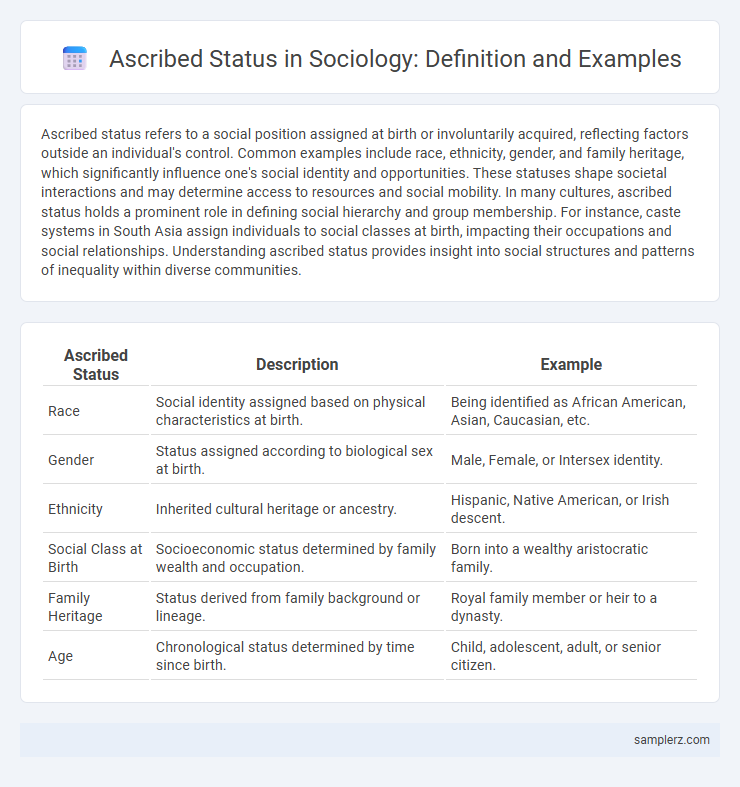Ascribed status refers to a social position assigned at birth or involuntarily acquired, reflecting factors outside an individual's control. Common examples include race, ethnicity, gender, and family heritage, which significantly influence one's social identity and opportunities. These statuses shape societal interactions and may determine access to resources and social mobility. In many cultures, ascribed status holds a prominent role in defining social hierarchy and group membership. For instance, caste systems in South Asia assign individuals to social classes at birth, impacting their occupations and social relationships. Understanding ascribed status provides insight into social structures and patterns of inequality within diverse communities.
Table of Comparison
| Ascribed Status | Description | Example |
|---|---|---|
| Race | Social identity assigned based on physical characteristics at birth. | Being identified as African American, Asian, Caucasian, etc. |
| Gender | Status assigned according to biological sex at birth. | Male, Female, or Intersex identity. |
| Ethnicity | Inherited cultural heritage or ancestry. | Hispanic, Native American, or Irish descent. |
| Social Class at Birth | Socioeconomic status determined by family wealth and occupation. | Born into a wealthy aristocratic family. |
| Family Heritage | Status derived from family background or lineage. | Royal family member or heir to a dynasty. |
| Age | Chronological status determined by time since birth. | Child, adolescent, adult, or senior citizen. |
Defining Ascribed Status in Social Contexts
Ascribed status in social contexts refers to the social position assigned to individuals at birth or involuntarily later in life based on characteristics such as race, ethnicity, gender, or family heritage. This status influences social identity and access to resources without consideration of personal achievements or choices. Examples include caste in India, racial classifications in the United States, and royal lineage in monarchies.
Gender as an Example of Ascribed Status
Gender is a primary example of ascribed status in social contexts, as individuals are assigned a gender at birth based on biological characteristics. This status often influences social roles, expectations, and access to resources without the individual's choice. Understanding gender as an ascribed status highlights how societal norms and institutions perpetuate gender-based inequalities.
Ethnicity and Race: Inherited Social Positions
Ethnicity and race serve as primary examples of ascribed status, where individuals inherit social positions beyond personal control. These inherited attributes significantly influence access to resources, social opportunities, and group identity within societal structures. The impact of ethnicity and race on social stratification highlights persistent disparities rooted in ancestry rather than achievement.
Social Class at Birth: A Lifelong Ascription
Social class at birth is a prime example of ascribed status, shaping an individual's opportunities, lifestyle, and social interactions throughout life without personal choice. This inherited social position determines access to education, healthcare, and economic resources, reinforcing social stratification and mobility limitations. Understanding ascribed status highlights the persistent influence of family background on social identity and societal roles.
Family Heritage and Lineage in Social Status
Family heritage and lineage serve as prime examples of ascribed status in social contexts, influencing an individual's social standing from birth. Ancestral background, such as noble descent or belonging to a prominent family, often confers prestige and privileges that shape opportunities and interactions within society. This inherited status remains largely fixed, impacting social identity and determining access to resources regardless of personal achievements.
Religion: Ascribed Identity from Childhood
Religion often serves as a prime example of ascribed status, where an individual's religious identity is assigned at birth or early childhood, shaping social roles and community belonging throughout life. This inherited religious status influences social expectations, cultural practices, and interpersonal relationships, often determining access to social networks and resources within specific faith-based communities. Ascribed religious identity highlights how societal structures and cultural norms embed lifelong social statuses beyond personal choice.
Age and Generational Roles as Ascribed Status
Age serves as a primary example of ascribed status, influencing social expectations and responsibilities assigned at birth or childhood without personal choice. Generational roles, such as being part of Baby Boomers, Generation X, or Millennials, shape identity and societal participation based on birth cohorts. These statuses determine social opportunities, privileges, and constraints within a community or culture.
Caste Systems: Structured Ascribed Status
Caste systems exemplify structured ascribed status by assigning individuals fixed social positions based on birth, often immutable throughout life. These rigid hierarchies dictate access to resources, occupations, and social interactions, reinforcing inequality and limiting social mobility. Examples include the traditional Indian caste system, where hereditary roles shape individuals' social identities and life chances.
Citizenship by Birth: National Identity as Status
Citizenship by birth serves as a primary example of ascribed status, where individuals inherit national identity without personal choice, shaping social roles and legal rights. This status establishes automatic membership within a nation-state, influencing opportunities for education, employment, and political participation. National identity derived from birthright citizenship profoundly impacts social stratification and individual identity formation.
Physical Attributes and Their Social Impacts
Physical attributes such as race, gender, and height often serve as ascribed statuses that significantly influence social interactions and opportunities. These inherent characteristics can determine access to resources, shape societal expectations, and affect perceptions of competence or authority. Consequently, individuals' physical traits play a crucial role in structuring social hierarchies and reinforcing inequality.

example of ascribed status in social Infographic
 samplerz.com
samplerz.com